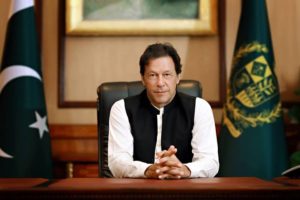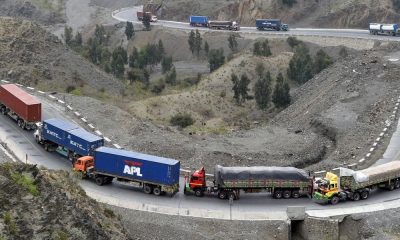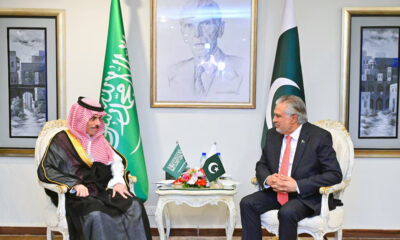Latest News
Pakistan’s PM Suggests Interim Setup In Afghanistan
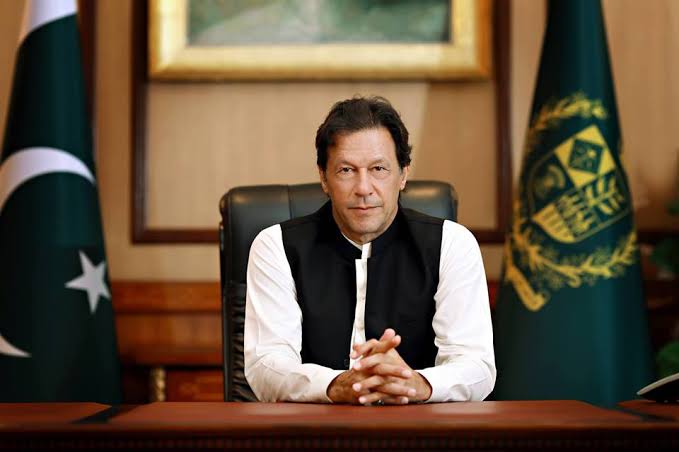
Pakistan’s Prime Minister Imran Khan on Monday suggested an interim setup in Afghanistan as a possible solution to an apparent impasse in the ongoing peace process, while blaming the Afghan government for the stalemate in talks, Pakistani media reported.
According to Pakistan’s Express Tribune, “the suggestion came during PM Khan’s interaction with journalists at his office here on Monday.”
“The Afghan government was a hurdle in peace process that was insisting that Taliban should talk to it,” said Khan, as quoted by the Express Tribune.
The premier also confirmed that he had canceled a scheduled meeting with Taliban leadership due to objections raised by the Afghan government.
Khan said that the Afghan peace process can only be successful if there is a neutral interim government, which can hold free and transparent elections to be participated by all the stakeholders.
“How much time it will take to set up an interim government and hold free elections, I cannot say,” he added.
The peace process in Afghanistan is aimed at ending the longest war that the US has ever fought. The Taliban and U.S. representatives last month in Qatar negotiated a draft, but no final deal on withdrawal of U.S.-led international forces and arrangements that the Taliban ensures militants would not use Afghanistan to stage attacks against the U.S. and its allies.
Pakistan’s Prime Minister noted that the US had acknowledged and appreciated Pakistan’s role for bringing peace and stability in Afghanistan.
Khan said the US thought it was only Pakistan that could bring the Taliban to the negotiating table.

Latest News
MSF ‘deeply concerned’ over new phase of deportations of Afghans from Pakistan

Médecins Sans Frontières (MSF) said Wednesday it was deeply concerned for the rights and welfare of Afghan refugees in Pakistan in the wake of the recent announcement by Islamabad that it plans to start Phase Two of the deportation campaign.
Pakistan is home to an estimated 3.7 million Afghans, and a reported 500,000 have crossed the border so far.
Many Afghans living in Pakistan have been there for decades and have spent more time in the country than their country of origin, without any legal recourse to remain in the only place they can effectively call “home”.
For many Afghans, Islamabad’s “repatriation” campaign means packing up their belongings and carrying them on a horse, cart, car and bus and traveling en masse to a country that is already struggling with widespread poverty, inadequate health services and increased restrictions on women, MSF said in a statement.
The second phase of the deportations leaves an estimated 800,000 Pakistan-issued Afghan Citizen Card (ACC) holders vulnerable to return, while phase three is expected to result in the further deportation of UNHCR-issued Proof of Registration (PoR) card holders, MSF said.
MSF first started working in Pakistan in 1986, and today provides much-needed medical care to people in Balochistan, Khyber Pakhtunkhwa and Sindh provinces.
The Islamic Emirate of Afghanistan (IEA) and UN agencies estimate that more than half a million people have been deported from Pakistan or voluntarily returned to Afghanistan in the past six months.
The United Nations High Commissioner for Refugees said last month that nearly two million Afghan refugees are living in Pakistan and that the agency needs $368 million this year to assist these people.
Latest News
2023 marred by ‘tremendous challenges’ for Afghanistan
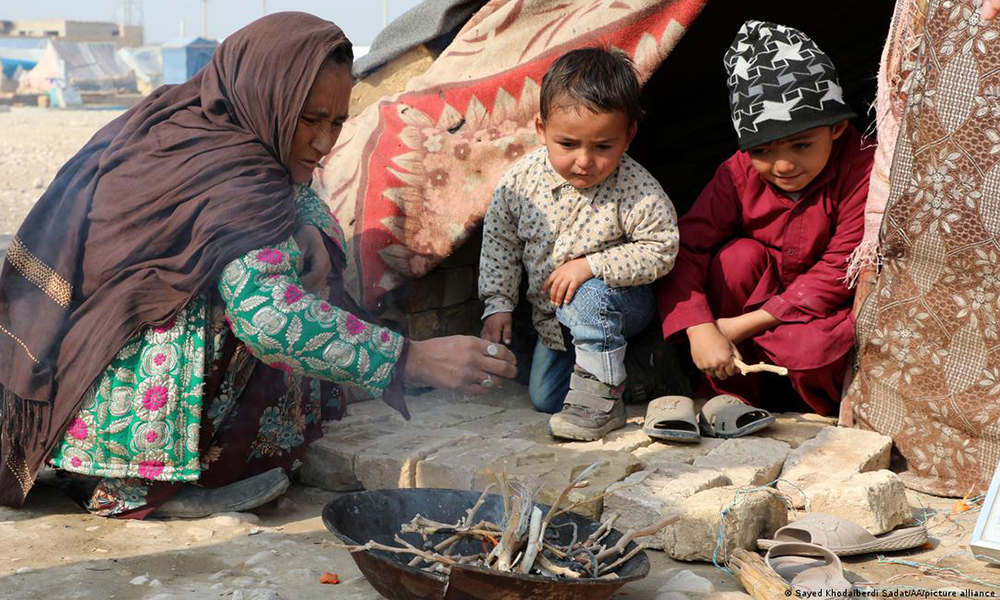
Last year, 2023, was a year of “tremendous challenges” for the people of Afghanistan, but it was also a year marked by resilience and determination, the Deputy Special Representative of the Secretary-General, Resident and Humanitarian Coordinator, Indrika Ratwatte, said in the UN’s annual report on Afghanistan that was published this week.
Ratwatte said: “In the face of adversity and multiple concurrent shocks, the people of Afghanistan have demonstrated remarkable courage and strength.”
Afghans now mention access to food as their most pressing need, he said adding that “unable to pay for or produce basic sustenance, millions face hunger and malnutrition.”
In 2024, an estimated 15.8 million people will experience crisis and emergency levels of food insecurity.
The majority of the population is unable to procure basic needs such as healthcare, food, livelihoods, and housing, the report stated.
The UN found that the country also remains vulnerable to climate change.
Following the worst drought in three decades, emerging El Niño conditions now threaten a new cycle of flooding and crop pests. In this context, lifesaving humanitarian aid has been crucial in preventing the collapse of the social fabric. It has also served to underpin the stability of the economy. Despite growing humanitarian needs, relevant funding cuts have forced humanitarian actors to prioritize the most vulnerable further, the report stated.
A Gallup poll found that 95 percent of the population consider themselves to be suffering. In addition to living in poverty, the average life expectancy in Afghanistan has been falling for the past five years.
The Herat earthquakes and unprecedented large-scale returns of refugees from neighbouring countries, including Pakistan and Iran, have shown the disruptive impact of recurrent shocks and underscored the need for sustained international engagement and support, the UN stated.
“As we embark on the next chapter, in 2024, it is imperative that we remain steadfast in our commitment to the principles of human rights, gender equality, and women’s Empowerment,” Ratwatte said.
“We will continue to include women as key partners in our work, to provide assistance ‘by women, for women’, and to tirelessly work for equal access to education in line with the demands we hear from Afghans in all areas of the country,” he said.
However, from an economic point of view, Afghanistan’s economy appears to be stabilizing at a low equilibrium level following a period of significant contraction since 2021.
The UN said in the report that growth barriers include severely restricted operations in the banking sector (including microfinance institutions), trade disruptions, and institutional issues hindering service delivery, including in the private sector.
“The sudden cessation of a significant amount of international aid and grants, which had accounted for 40 percent of the country’s Gross Domestic Product (GDP), along with a freeze on international reserves amounting to about US$9 billion and the imposition of international sanctions, caused a severe balance of payments, banking and payment systems crisis.
“Notably, financial restrictions have removed liquidity from the banking system,” the report stated.
Despite the crisis and a period of devaluation towards the end of the year, the AFN is 20 percent stronger than it was in 2021 due to currency export controls, UN cash shipments of US dollars into Afghanistan, and personalremittances.
Imports continued to surpass exports through 2023 and increased as the economy contracted.
“This appears to be a paradox: the currency appreciated while the trade deficit widened, suggesting that there might be other unidentified sources of financing besides US dollar cash shipments and remittances to support the account deficits,” the report read.
The UN also said that with its partners, it will work to initiate a dialogue with the Islamic Emirate on adjustments to regulatory frameworks and sustained public service delivery with the aim of creating a long-term and sustainable pathway to reduce aid dependency and put Afghanistan back on a path towards development
“In this regard, we reiterate our offer to the DFA for a dialogue and will work jointly with international partners, donors, and Afghans on how such engagement can be structured in a most productive way.”
Latest News
Beijing hosts Afghan delegation for talks on a wide range of issues

The third meeting of the China-Afghanistan working-level liaison mechanism on humanitarian assistance and economic reconstruction was held in Beijing this week where in-depth talks were held on numerous issues relating to Afghanistan.
Liu Jinson, Director of the Asian Department of China’s Ministry of Foreign Affairs, and Jalali, Director of the Third Political Department of the Ministry of Foreign Affairs of Afghanistan, co-chaired the Beijing meeting.
Also in attendance were representatives from various Chinese commissions, government departments, international aid organizations, as well as the Afghan Ministry of Commerce and Industry, the Ministry of Mines and Petroleum, the Ministry of Disaster Management, and the Ministry of Refugee Affairs.
Quoting an Afghan proverb, Liu said at the meeting that “friends come and go, but neighbors always remain.”
He pointed out that since 2021, China has implemented a diplomatic concept of amity, sincerity, mutual benefit and inclusiveness that was proposed by President Xi Jinping in terms of Beijing’s dealings with Afghanistan.
China has also adhered to a friendly policy towards all Afghan people, and adhered to the principle of respect for the country’s independence, sovereignty and territorial integrity.
He also said that during the different regimes in Afghanistan, China has always provided support and assistance for Afghanistan’s peaceful reconstruction and economic development.
The Afghan delegation meanwhile stated that the Islamic Emirate attaches great importance to developing relations with China, and thanked China for taking the lead in sending a new ambassador to Afghanistan and accepting the appointment of an ambassador to China.
The Islamic Emirate said Afghanistan is willing to deepen friendly relations with China, maintain traditional friendship, and will, as always, support China in safeguarding its core interests and achieving national reunification.
The two sides agreed in the meeting that Afghanistan is currently facing multiple challenges such as floods, droughts, and refugee resettlement, among other issues.
They also noted that the freezing of Afghanistan’s foreign assets by the United States has “aggravated the suffering of the Afghan people.”
The IEA stated however that it was “very grateful to China for its humanitarian assistance over the years and hopes to continue to receive help from China in refugee resettlement, disaster prevention and mitigation, improvement of medical and health conditions, and treatment of children with congenital heart disease.”
On the Belt and Road initiative, the IEA delegation said Afghanistan is deeply satisfied with the progress in practical cooperation between the two countries. They also said Afghanistan is willing to learn from China’s experience in modernization and development, and hopes that China will help Afghanistan cultivate more professional talents.
China meanwhile urged the international community to step up humanitarian assistance to Afghanistan, and said Beijing hopes the IEA will “actively respond to some of the international community’s reasonable concerns about Afghanistan’s inclusive governance.”
Liu in turn acknowledged the IEA’s efforts to promote economic reconstruction and said bilateral trade volume between China and Afghanistan reached US$1.33 billion last year, a record high and a year-on-year increase of 125.4%.
The Islamic Emirate meanwhile said in posts on X that the issue of investment opportunities in Afghanistan was widely discussed and both sides welcomed moves to pave the way for the export of pomegranates.
“Also, both sides talked about the latest developments in increasing the level of oil extraction in Afghanistan and starting the extraction of Logar’s Mes Aynak mine and it was emphasized that plans should be considered to speed things up,” the IEA stated.
“The Afghan side welcomed the capacity building training programs of civil servants in many ministries and agencies of the Afghan government with the support of China. In addition, the Chinese side promised to expand the range of scholarships to Afghan students according to the needs of Afghanistan,” the IEA stated.
-

 Sport5 days ago
Sport5 days agoACL draw to be broadcast live on ATN channels
-

 Regional5 days ago
Regional5 days agoIRGC chief warns of harsher response if Israel attacks Iran
-

 Sport4 days ago
Sport4 days agoACL fever grows as fixtures finalized
-

 Sport5 days ago
Sport5 days agoHetmyer powers Rajasthan win in low-scoring IPL thriller
-

 World4 days ago
World4 days agoUS will not take part in any Israeli retaliatory action against Iran
-

 Latest News4 days ago
Latest News4 days agoOver 50 people dead in traffic accidents over Eid
-

 Latest News4 days ago
Latest News4 days agoUS identifies Kabul airport suicide bomber
-

 Business4 days ago
Business4 days agoAfghanistan-Kazakhstan chamber of commerce opens in Herat

